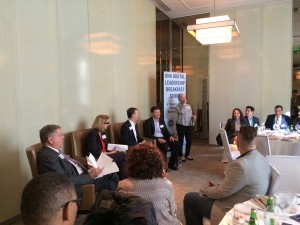
ONA Executive Director Jane McDonnell introduces speakers for the morning.
The following take-aways are from an off-the-record conversation hosted as part of ONA’s Digital Leadership Breakfast series, sponsored by the Dow Jones Foundation, held Jan. 20 in Miami. These events are designed as a forum for senior digital media leaders to exchange ideas, challenges and solutions.
Speakers:
- Mark López, Executive Vice President and General Manager, Univision Digital
- Jim McKelvey, Co-Founder, Square and LaunchCode
- Alexandra Villoch, President and Publisher, Miami Herald Media Co.
- Moderator: Alberto Ibargüen, President, John S. and James L. Knight Foundation
Here is a quick list of insights that emerged during our great conversation:
1. Miami is a great microcosm of what many American cities will look like in the next decade. The population is diverse and growing. The city is attracting more talent and more companies, creating many more possibilities for further growth and innovation. Because this growth is multicultural and spans age ranges, the people of the Miami are primed to adapt to rapid change.
2. Miami has many potential “Growth consumers”: new consumers coming to your brand in the next 10 years. Exploring growth consumers might include connecting with new people moving into an urban area, better understanding the multicultural aspects of a Latino audience and of course, recognizing relevant segments of a millennial audience. Miami has all three of these key pieces, making it a prime place to study and understand growth potential.
3. Next-gen companies are more about being a great production company. Audiences are increasingly seeking vertical news through a variety of platforms. How can we produce and optimize content for those platforms? For instance, Snapchat is a huge, tremendous distribution platform for content right now; but don’t simply align yourself to a single platform, follow the overall trend. Shooting good video and creating other short visuals are as valuable as writing.
4. Challenges for Miami media: With a quickly transitioning city, how do you create a sense of place and community with journalism? There has been tremendous growth in Miami over the last 10 to 15 years. How can media companies bring more talent to the city and encourage them to stay, especially those with computer programming talent? Even if they only stay for a little while, everyone benefits. For legacy media, the Achilles heel is getting a print product to customers in a city in which people are getting up earlier and earlier because of traffic conditions.
5. Culture: The DNA of organizations is changing. If you’re used to owning the entire production ecosystem, digital is fundamentally different, since news outlets don’t always control every aspect of news delivery. ONA is the exploration of how organizations can do this: deliver news consistently and reliably in a way that people will actually use. If legacy looked like a start-up it would be very, very nimble. The new leadership decision-making model is to make many small failures instead of one big one.
6. Educators: Tailor curriculum to local business needs (a good example: Miami Dade College). That ability to respond helps us (the digital media) hire great talent and innovate. Media companies are hiring for jobs that didn’t exist one to two years ago. For example, web video production is increasingly important for J-school graduates, as is asking for competencies on Twitter, Facebook and other things that were not part of the job interview in the past. Additionally, data management and data visualization production are key to every story that’s out there.
ONA’s Digital Leadership Breakfast Series is sponsored by the Dow Jones Foundation.
